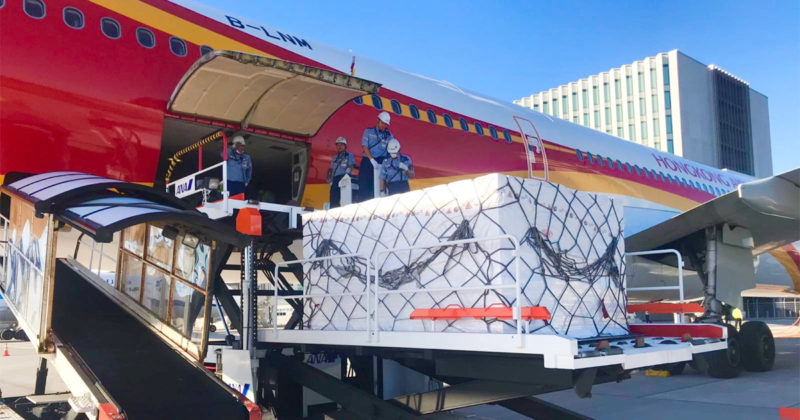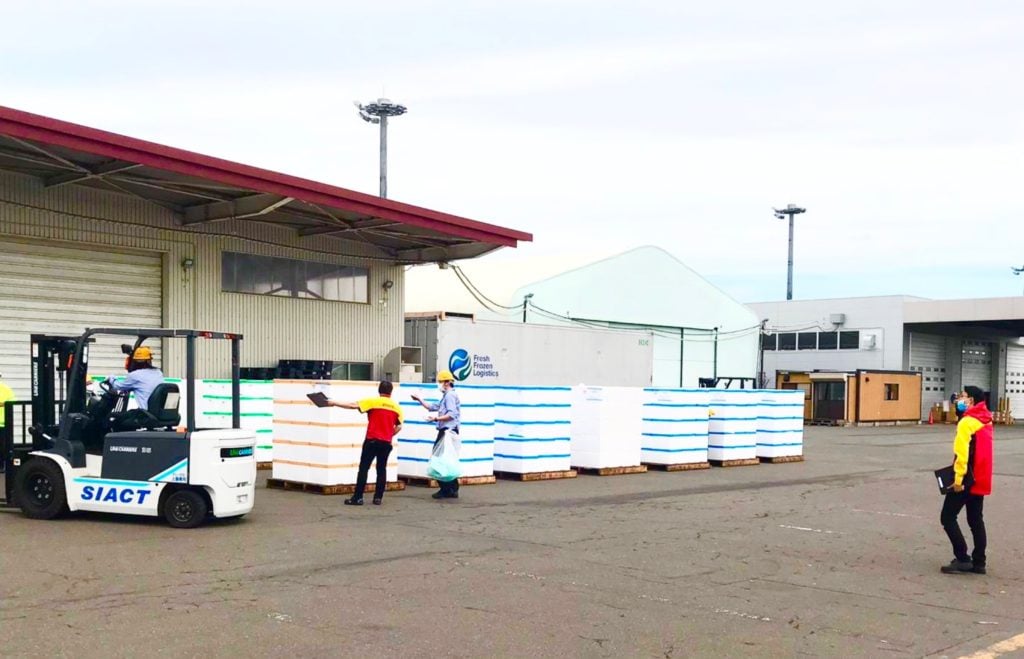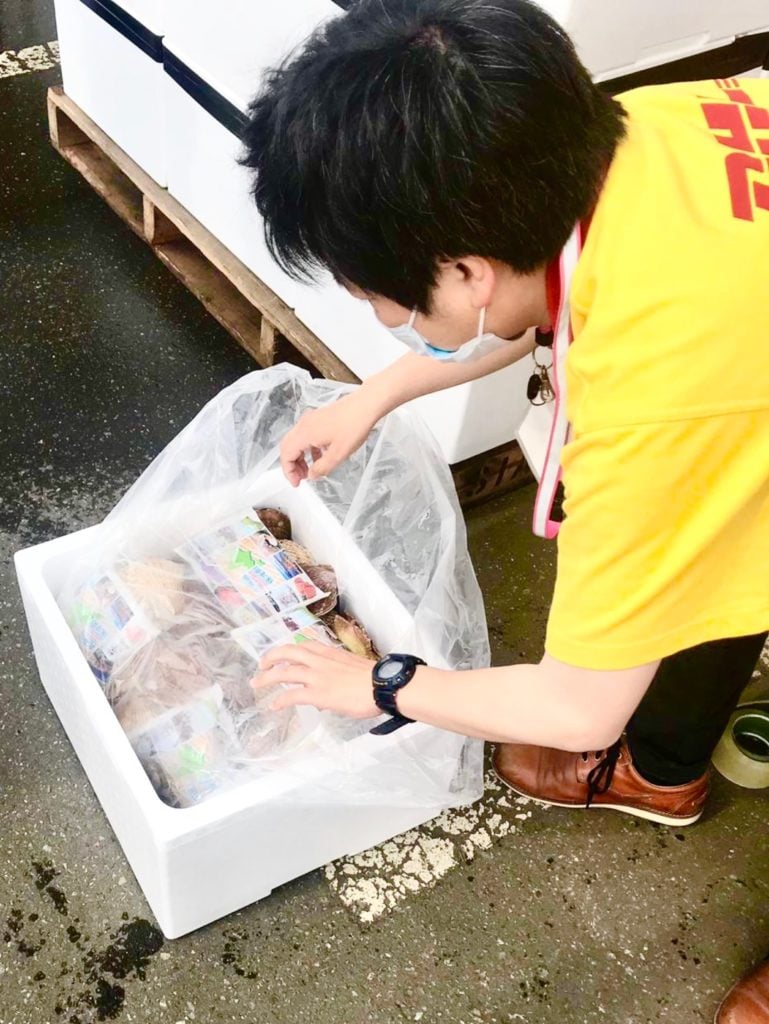北海道のホタテ貝は、迅速なチャーター輸送手配にて輸出再開を果たす

北海道の漁師は、漁を脅かす様々な要素に対して常に静観しています。それでも、新型コロナウイルスのパンデミックが北海道を襲った事態には、困惑せずにはいられません。
2020年2月下旬、新型コロナウイルスの蔓延を食い止めるために、北海道では3週間の非常事態宣言の一環として、厳格な封じ込め措置を実施しました。封鎖が解除された直後、離島での感染が確認されたため、政府は数週間におよぶ別の封鎖を実施しました。
封鎖期間中は、必要不可欠なサービスのみ営業が許可された状況の中、フライトの欠航などの問題が重なり、漁業や農業で生計を立てていた多くの北海道の生産者は先の見えない状況に不安を感じていました。
そして2020年3月末には、さらに大きな打撃を受けました。
全ての航空会社は、北海道の主要な空港であり、新鮮な生鮮魚介類を世界へ輸出していた新千歳空港からの国際便の運航を一時停止しました。
中国からの生鮮品需要を満たす
日本最大の生産地である北海道のホタテ貝生産者にとって、6月から10月まで続く出荷シーズンは重要な時期です。しかし、新型コロナウイルスの影響による渡航制限中のため、北海道の生産者は、ホタテ貝をはじめとする海産物を日本の農水産品の最大の輸入国である香港に直接空輸することができませんでした。
北海道から香港への最初のチャーター便は、最大29,000キログラムのホタテと600キログラムのナマコを出荷することに成功しました。
「数週間続いた渡航制限が徐々に解除されつつある中、各国とも回復には時間がかかっており、新鮮な生鮮魚介類を日本から海外の消費者に届けることは急務でありました。」 とDHL グローバルフォワーディング 北アジア南太平洋地区CEO兼DHLグローバルフォワーディングジャパン株式会社 代表取締役社長である チャールス カウフマンは述べています。
DHL グローバルフォワーディングジャパン株式会社は、北海道からの国際線の運航が停止した後、北海道の生産者が危機を乗り切るために介入し、パートナー各社と協力して千歳から香港への最初で唯一の直行便を迅速に手配しました。
2020年6月12日に開始されたチャーター便は、北海道のホタテ貝をはじめとする新鮮な生鮮魚介類を最大の輸出市場である香港に直接輸送します。また、中国における日本からの農水産品輸入額は、2019年には39%増の1.6兆円(133億ユーロ)に達しています。
DHL グローバルフォワーディングジャパン株式会社は、2020年12月12日には100回目のチャーター便輸送を祝い、最大35,200キログラムを運ぶことができるA330-300航空機を利用して、千歳から香港まで週5回直行便を運航しています。
これらチャーター便は、新千歳空港発着の貨物チャーター便の運航を促進するために、北海道空港株式会社により着陸料が免除されました。
出荷量はまだコロナ以前のレベルに戻っていませんが、2020年6月初めに香港に向けられた最初のチャーターは、最大29,000キログラムのホタテと600キログラムのナマコを出荷することに成功しました。
北海道の生鮮品を世界に広める
北海道の生鮮品を世界に広める
DHL グローバルフォワーディングジャパン株式会社は、世界中で高まる日本の高級海産物の需要をサポートするため、2019年7月に北海道千歳市に自社支店を開設しました。
海外への進出を目指す地元の生産者の方々へ、海外市場への輸出に伴う通関手続きの専門知識を提供し、信頼性の高い最新の冷却設備による輸送を行うことで、海産物の品質を保証します。
ホタテ貝をはじめ、ナマコやメロンなどの生鮮品の輸出ルートが確立されたことにより、北海道の生産者は収穫した農水産物を新鮮な状態で、タイムリーに消費者へ届けることができます。」とカウフマンは述べています。
世界的なパンデミックにより、主要な海産物輸出国は、生産の長期的な遅延からロジスティクスおよび輸送の中断まで、様々な問題に対処することを余儀なくされています。
日本は、パンデミックの影響から水産および農業の輸出も落ち込んでいます。財務省の報告によると、2020年5月の総輸出額は前年同月比28.3%減の4.18兆円となり、18ヶ月連続低迷しています。
より多くの国で制限が緩和され、営業を再開するにつれて、少しでも早く正常な状況に戻ることを願います。
更新:DHL グローバルフォワーディングジャパン株式会社は、2021年4月時点で、北海道から200回を超えるチャーター輸送を達成しました。






 日本語
日本語